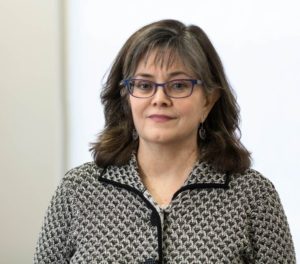New Buildings Institute (NBI) enthusiastically welcomes two influential leaders to its Board of Directors this year. Dr. Tina Jayaweera is a Power Planning Resources Manager at Northwest Power and Conservation Council. Susan Rochford is Vice President of Energy Efficiency, Sustainability and Public Policy for Legrand North America and Central America. These professionals bring broad experience and a wealth of knowledge to NBI’s governing body.
We had the opportunity to ask Tina and Susan some questions about their background, work priorities, industry challenges, and what interests them most about leading NBI.
Question: Tell us a little about your background, how did you get involved in this industry and your company or organization?
 Susan Rochford: I started out with a great fascination for public policy and international relations and went to Washington, DC after earning an undergraduate degree in Political Science. My exposure to international business, buildings and energy efficiency began when I joined Honeywell as Director, International Affairs. I devoted considerable time to working with DOE and NGOs that were trying to introduce energy efficiency technologies to China and the Former Soviet Union. While at Honeywell I was also introduced to the concepts of corporate social responsibility and sustainability, and this resonated deeply with me as I learned of the inherent power business has to affect positive change. I turned my career path in this direction and was fortunate to be brought on by Legrand’s North American CEO to launch our company’s sustainability efforts. Legrand has a track record of helping its customers save energy, which is a very critical aspect of our CSR and Sustainability commitment. In fact, helping our customers avoid carbon emissions is one of the priorities of Legrand’s newest CSR Roadmap (2022-2024). We have committed as a company to decarbonize by 2050 and want to help our customers do the same.
Susan Rochford: I started out with a great fascination for public policy and international relations and went to Washington, DC after earning an undergraduate degree in Political Science. My exposure to international business, buildings and energy efficiency began when I joined Honeywell as Director, International Affairs. I devoted considerable time to working with DOE and NGOs that were trying to introduce energy efficiency technologies to China and the Former Soviet Union. While at Honeywell I was also introduced to the concepts of corporate social responsibility and sustainability, and this resonated deeply with me as I learned of the inherent power business has to affect positive change. I turned my career path in this direction and was fortunate to be brought on by Legrand’s North American CEO to launch our company’s sustainability efforts. Legrand has a track record of helping its customers save energy, which is a very critical aspect of our CSR and Sustainability commitment. In fact, helping our customers avoid carbon emissions is one of the priorities of Legrand’s newest CSR Roadmap (2022-2024). We have committed as a company to decarbonize by 2050 and want to help our customers do the same.
 Tina Jayaweera: My graduate degree is in mechanical engineering, and I have always had an interest in efficient building design. When my husband accepted a job at Intel, we moved to Portland and I took advantage of the strong local workforce in energy-related fields. Through some luck, I was able to start working at a demand-side management consulting firm Cadmus (then, Quantec). My primary role at Cadmus was to assist utilities with developing conservation potential assessments to use to estimate the amount of energy efficiency and demand response that might fill their long-term power needs. Through that position, I engaged with the Power Council and gained appreciation for their staff and work. I was fortunate to join the Council in 2014 as a Power Planning Resources Manager.
Tina Jayaweera: My graduate degree is in mechanical engineering, and I have always had an interest in efficient building design. When my husband accepted a job at Intel, we moved to Portland and I took advantage of the strong local workforce in energy-related fields. Through some luck, I was able to start working at a demand-side management consulting firm Cadmus (then, Quantec). My primary role at Cadmus was to assist utilities with developing conservation potential assessments to use to estimate the amount of energy efficiency and demand response that might fill their long-term power needs. Through that position, I engaged with the Power Council and gained appreciation for their staff and work. I was fortunate to join the Council in 2014 as a Power Planning Resources Manager.
Question: What inspired you to join New Buildings Institute’s Board of Directors?
Tina Jayaweera: NBI puts into practice much of what the Council’s analysis demonstrates as being necessary for maintaining an adequate and reliable power system. Participating directly with this hands-on work not only strengthens my ability to be successful in my job, but it also hopefully gives NBI insight into long-term trends that we at the Council see as driving changes in the electric power system.
Susan Rochford: I came to learn about NBI’s work through my engagement in energy efficiency policy in Washington, DC, and through some of my colleagues who rely upon NBI for their groundbreaking work in shaping building advanced building energy codes. NBI’s mission is focused, powerful and represents a vital contribution to addressing the climate crisis. I was honored to be asked to serve and appreciate that NBI’s leadership seeks to bring diverse perspectives to the Board, including from manufacturing community. It’s an opportunity to foster greater understanding and alignment amongst the all the stakeholders to realize the goals of net-zero and decarbonization through market transformation.
Question: What areas of NBI’s work intersect most with your role at your company/organization?
Susan Rochford: Part of my role at Legrand is to engage in the public policy arena, with an emphasis on policies that create the enabling conditions for the design, construction (or renovation) and operation of high performance buildings. What constitutes a high performance building is ever-evolving, and it is part of our CSR commitment to be part of the solution to achieving net-zero buildings and decarbonization. So the research and guidance that NBI provides is valuable to our efforts, and conversely, the real-world conditions we face in trying to help our customers can provide context and insights to the NBI team.
Tina Jayaweera: All of NBI’s work that aims to reduce electricity consumption and improve integration with the power grid are relevant to my work. In particular, the grid-optimal buildings and advanced water heating initiatives are closely related to analysis I do at the Council in understanding the changes in electric loads and how best to meet those needs.
Bonus question for Susan: Legrand was a sponsor of Next Gen, NBI’s professional development program designed to support students of color, in 2021. From your perspective, why is workforce development critical for the future of our industry?
Susan Rochford: Workforce development is crucial for any industry. It’s no secret that some areas of the building trades are facing attrition as the workforce retires. The talent pipeline must be continually renewed. But we also recognize that it’s vital that the talent be broadly representative of the customers and communities we serve. We have come to understand that the policies, regulations, codes, government programs and other forces shaping buildings can have different and even adverse impacts for communities. By supporting the NextGen program we can help expose students from a wider range of communities to the industry and the challenges it faces. We hopefully can inspire these student to lend their talents and voice to creating high performance buildings that meet the climate challenge and do so equitably, fairly, affordably and with full concern for the health and well-being of the occupants.
Bonus question for Tina: From your perspective, what are the biggest areas of opportunity in the next 3-5 years to help us mitigate the effects of climate change?
Tina Jayaweera: The power system is rapidly changing to be less carbon intensive, but that change will require the demand side to be more flexible to work with the increase in variable resources on the supply side (e.g. wind, solar). Thus, by considering grid interactivity of buildings and incorporating “grid-ready” equipment to facilitate that integration will be crucial to ensure that the clean power can be delivered when and where it is needed. Transportation electrification is also a significant factor for mitigation and enabling sufficient and efficient charging will be needed to support that transition.
by Connie Umphress, Marketing and Communications Manager, New Buildings Institute
Did you enjoy this content? Consider supporting NBI’s work with a donation today.
